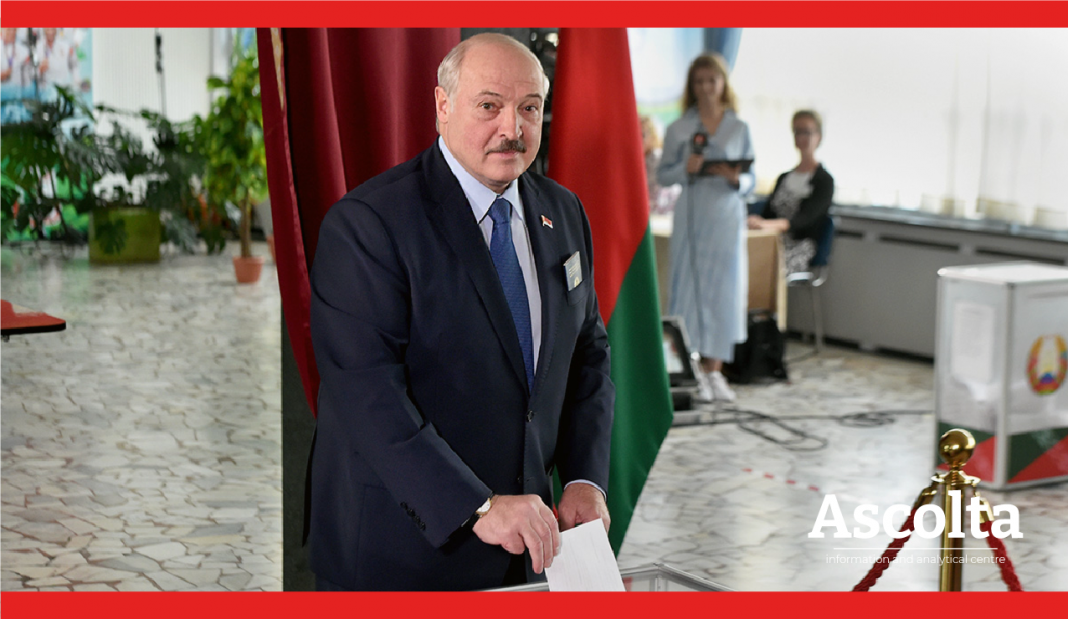On February 24, 2024, parliamentary elections (elections of deputies to the House of Representatives of the National Assembly of the VIII convocation) were held in the Republic of Belarus. 110 deputies were elected in majoritarian constituencies. The previously planned transition to Belarusian multi-party system and party-based elections, which was discussed in 2021, was postponed. Representatives of the pro-presidential party “Belaya Rus,” created in 2023 to support the policy of Alexander Lukashenko (based on the public movement of the same name), received the largest number of votes. Representatives of this party received 51 mandates. 8 mandates went to representatives of the center-left Republican Party of Labor and Justice (after the events of 2020, the party changed its leadership and declared support for the policy of Alexander Lukashenko). Another 7 mandates – representatives of the Communist Party of Belarus. 4 mandates – representatives of the Liberal Democratic Party (political partners of the Russian LDPR). 40 mandates – “independent candidates.” Since the opposition boycotted the elections, there are no representatives of opposition forces in the current convocation of the parliament. Svetlana Tikhanovskaya, a presidential candidate in the 2020 election, said the vote “does not meet any democratic standards and more resembles a military operation against its own citizens, the constitution and common sense.” “I call on Belarusians and the international community to categorically reject this deception,” she said in a post published on social network X.
In this piece Ascolta analyzes the internal political processes in the country, which three months after the elections have almost completely passed through all the planned stages of transformation, which allows for a more qualitative study and identification of new trends and further prospects for their development.
This Content Is Only For Subscribers
Among the landmark figures who made it to the lower house of the National Assembly are the following:
- head of the Presidential Administration Igor Sergeenko;
- Minister of Labor and Social Protection Irina Kostevich;
- Deputy Commander of the Air Force and Air Defense Forces Anatoly Bulavko;
- head of the Federation of Trade Unions of Belarus Mikhail Orda;
- Oleg Romanov, leader of the “Belaya Rus” party, which had a majority in the previous convocation;
- Minister Counselor of the Belarusian Embassy in Russia Alexander Shpakovsky;
- track and field athlete Anastasia Mironchik-Ivanova;
- official representative of the Prosecutor General’s Office Angelika Kurchak;
- Vadzim Gigin, a sub-sanctioned publicist and former head of the AP magazine “Belaruskaya Dumka”;
- The uncle of Belarusian TV presenter Grigory Azarenok, deputy head of Lepel District Executive Committee Viktar Azarenok.
According to CEC calculations, turnout was 73.09%, but 41.71% of people voted in the early elections, which took place from February 20 to 24.
There were no Western observers at the voting, they were not invited; the elections were observed by experts from the structures friendly to the Belarusian authorities – the Commonwealth of Independent States, the Collective Security Treaty Organization, and the Shanghai Cooperation Organization. The head of the CIS mission Sergei Lebedev assessed them positively on the day of the election.
The U.S. State Department expressed its assessment – Washington condemned the Belarusian elections, calling them fictitious. “The elections were held in an atmosphere of fear, in which no electoral process can be called democratic. The regime still holds more than 1,400 political prisoners. All independent political figures have either been detained or exiled. All independent political parties were denied registration. Belarusians abroad could only vote if they returned to Minsk, where they would likely face repression. These abuses effectively froze genuine political activity and discourse inside Belarus,” the State Department said.
Personnel changes
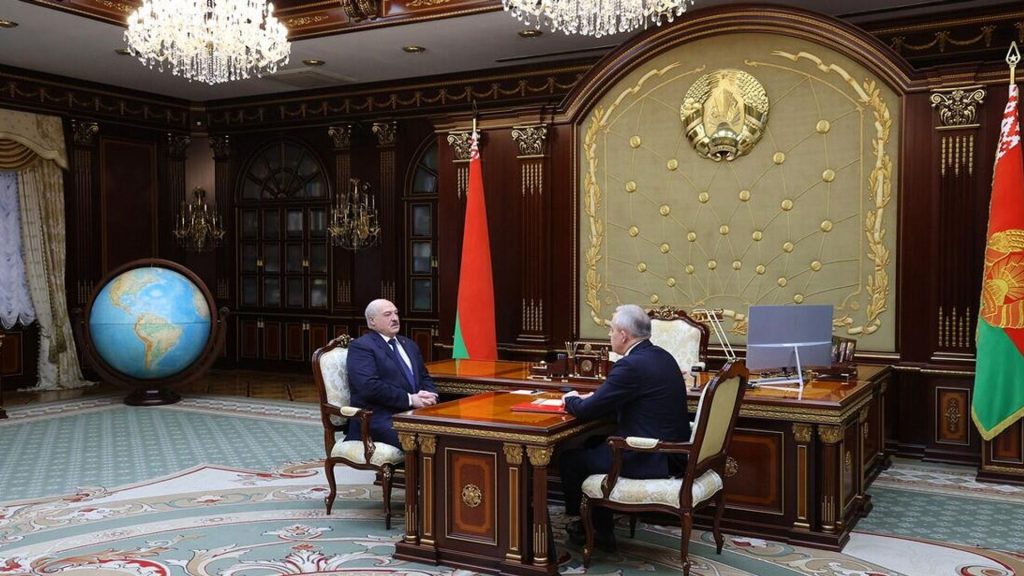
Following the results of the elections, the country underwent serious personnel changes. On March 29, Alexander Lukashenka signed decrees according to which a number of officials were relieved of their posts. In accordance with Article 84 of the Constitution of the Republic of Belarus, Igor Sergeenko was relieved of the post of Head of the Presidential Administration of the Republic of Belarus due to his election to the Parliament. It is expected that he may head the lower chamber. If Natallia Kochanova remains the head of the upper chamber after the election of the upper chamber, the “Vitsebsk clan” will fully control the parliament of Belarus.
The head of the Presidential Administration has not been appointed yet (first deputy head Maxim Ryzhenkov, who is likely to head the AP, is acting; Ryzhenkov is the son of Lukashenko’s late close friend, former Minister of Sports and Tourism of Belarus and chairman of the Olympic Committee of Belarus).
In March 2024, Lukashenko appointed 38-year-old banker Alexander Yegorov, who was executive director and deputy chairman of the board of Belarusbank in 2015-2021 and served as chairman of the board of the Development Bank of the Republic of Belarus in 2021-2024, as deputy head of the Presidential Administration. Egorov was promoted to the post of deputy head of the Administration by Nikolai Snopkov, the current first deputy chairman of the Council of Ministers of the Republic of Belarus, Lukashenko’s closest economic adviser. What is interesting: Egorov studied in the United States, which is highly reprehensible in today’s Belarus. But, according to political observer Alexander Fridman, “we are talking about modernization of the control and accounting system, so we need a person who is well versed in finance.
Another deputy head of the Presidential Administration of the Republic of Belarus on April 4, 2024 was appointed 50-year-old Vladimir Pertsov, who previously worked as director of the National Branch (representative office) of the Interstate TV and Radio Company “Mir” in Belarus, and in 2021-2024 – Minister of Information. Pertsov will be in charge of building information content and fighting against information attacks. In this respect, he will work closely with Lukashenka’s press secretary Natalia Eismont, considered one of the most influential women in the country.
On March 6th , Lukashenka appointed Mikalai Shkreda first deputy head of the Presidential Affairs Directorate (and dismissed him from the post of deputy head of the Presidential Security Service). He is considered close to the “gray cardinal” Viktar Sheiman. It is expected that Shkred may soon become the Manager of Presidential Affairs.
Minister of Labor and Social Protection Irina Kostevich, Assistant to the President of the Republic of Belarus – Inspector for Minsk Alexander Barsukov, Director of the National Center for Legislation and Legal Research Vadim Ipatov, Rector of the Academy of Management under the President of the Republic of Belarus Vyacheslav Danilovich were also dismissed.
Also, in accordance with Article 84 of the Constitution, Major-General Hennadii Lepeshko was dismissed from the post of the head of the educational institution “Military Academy of the Republic of Belarus”, and Major-General of Justice Andrei Lis – from the post of the head of the Department of the Investigation Committee of the Republic of Belarus for Minsk region. They suspended, respectively, military service and service in the Investigative Committee in connection with their election as deputies of the House of Representatives of the National Assembly for the term of their powers.
On April 4, Colonel Dzmitry Sobol was appointed first deputy head of the Military Academy of Belarus. Col. Ihor Kozlov, who previously held this position, was appointed deputy commander of the troops of the North-Western Operational Command of the Armed Forces. He replaced Major-General Vladimir Kulazhin, who was dismissed from military service as a reserve officer with the right to wear military uniforms and insignia.
On April 12, Lukashenka appointed Leonid Zayats, Siarhei Khomenko, and Uladzislau Tatarinovich as members of the Council of the Republic (upper chamber) of the National Assembly of the eighth convocation. In accordance with the Constitution, Leonid Zayats and Siarhei Khomenko were relieved of their posts of deputy prime minister and minister of justice, respectively.
On April 18th , Lukashenka signed a decree “On appointment and dismissal of judges”. Andrei Aleshchanka, who had previously served as a judge of the Supreme Court, was appointed Deputy Chairman of the Supreme Court. Personnel changes also took place in the courts of district and regional levels.
April 22, Lukashenka appointed Siarhei Masliak as Minister of Natural Resources and Environment, Yauhen Kavalenka as Minister of Justice and Alena Morgunova as Chairperson of the State Committee on Standardization.
Finally, on 10 May Lukashenka dismissed Major-General Viktar Gulevich, chief of the General Staff of the Armed Forces of Belarus and first deputy defense minister. He was dismissed from military service with the wording “due to age with the right to wear military uniform and insignia”. Gulevich, like General Kulazhin, dismissed earlier with the same wording, is 55 years old. Gulevich was appointed to the post of Chief of the General Staff of Belarus in March 2021. Prior to that, he served as commander of special operations forces of the Armed Forces of Belarus and commander of the Western Operational Command of the country. General Gulevich was an opponent of the participation of the Armed Forces of Belarus in the fighting in Ukraine. “Gulevich believed that the army was not ready for active operations; its combat capability did not meet Russia’s expectations. At the same time, Lukashenko regards Gulevich’s work as unsatisfactory,” said a source in Minsk. Interestingly, the dismissal took place immediately after Lukashenko’s return from Moscow, where he had a long discussion with Vladimir Putin about the military situation in the Ukrainian direction on the night of May 8-9.
All-Belarusian People’s Assembly
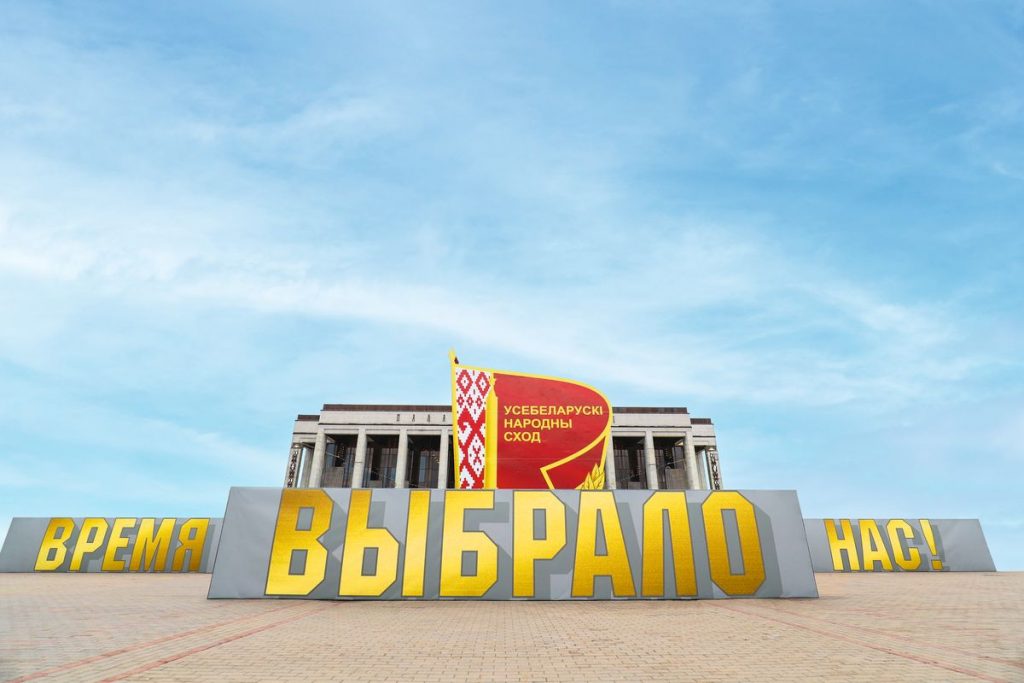
On April 24-25, the All-Belarusian People’s Assembly – a congress of deputies of all levels – was held. This was the first meeting of the forum in a new capacity, fixed in the updated Constitution of the Republic of Belarus.
A peculiarity of the new status of the All-Belarusian People’s Assembly is that now this body will meet not once every five years, as before, but at least once a year. The term of office of the body is five years. The All-Belarusian People’s Assembly has been held in Belarus since 1996. Today it is the supreme representative body of the Republic of Belarus, which determines the strategic directions of development of the society and the state, ensures the constitutional order. The All-Belarusian People’s Assembly has the right to approve the main directions of domestic and foreign policy, the military doctrine, the concept of national security; to approve the programs of social and economic development of the Republic of Belarus; to hear the Prime Minister on the implementation of the programs of social and economic development of the Republic of Belarus. The All-Belarus People’s Assembly is vested with the right of legislative initiative. Decisions of the All-Belarusian People’s Assembly are binding and may cancel legal acts and other decisions of state bodies and officials that contradict the interests of national security, with the exception of acts of judicial bodies.
Thus, a body that stands above the Parliament and the rest of the authorities has appeared in Belarus.
The SNC was attended by 1165 delegates from all over Belarus.
Main theses of Alexander Lukashenko’s report on the first day of the All-Belarusian People’s Assembly:
- “Today’s event actually divides the history of the country’s political life into before and after. And this is an evolutionary movement and development. The historicity of the moment is determined not only by the new status, new functions, new powers of you delegates. What is important is not what we do, but how we do it – how we improve the model of political structure. Without breaking the way of life, without abandoning traditions – evolutionarily, in the Belarusian way, in a balanced manner, without sudden movements. Relying on the opinion of the majority.
- “We are strengthening the role and status of the power of the people’s representatives. And here it is important to emphasize that in principle we do not separate the power from the people. In Belarus, there is only one way to high positions – through the ability and desire to work honestly for the good of their country. And whoever we are in this hall, wherever we work, there is no distance between us. We all have the same status here – participants of the All-Belarusian People’s Assembly. Delegates and invitees. And I am most proud of this achievement of national democracy.
- “Lukashenka called the APA a protective buffer against possible dangerous processes that go against the interests of society and the state. “All your decisions in the hierarchy of legal acts of the country will take the highest position and become generally binding. All citizens, all bodies and institutions of power will have to fulfill them. I will say more. The APA has received exclusive powers to suspend the decisions of any body or official. Lukashenko also said that the APA “saved Belarus” in 2020.
- “Colored revolutions do not arise and win on the bare ground. Where the people are driven to poverty and the leaders are picking their pockets with loot, it doesn’t take much effort to bring people to the streets and bring down the country. It is enough to remind about accounts in foreign banks – the rulers will give up the country themselves. There are plenty of examples. From Haiti to the Philippines.
- On the events of 2020: “We have gained tremendous experience from what has happened, we have become a united and mature nation. We have, indeed, become stronger. We then, in 2020, looked at ourselves, our lives and what surrounds us. We assessed what we could lose, saw the true face of both internal and external opponents and enemies.
- “Ukraine today is a testing ground where the fate of the future world order is partly decided. The largest nuclear powers, albeit indirectly, are actually fighting on its territory. And the authorities have stooped to a deal with the West, exchanging weapons for the lives of Ukrainians.”
- “A community of common destiny with all mankind” is the model of unity of nations without prejudice to national cultures, ideologies, sovereignties. Without suppression and a sense of superiority. Without the rattling of weapons. By the power of wisdom and intellect. The project of such a just world order proposed by China has the right to life. Moreover, it is very close to us, the Belarusians.
- Lukashenko asked not to confuse peace-loving Belarusians with pacifism. “As threats grow, we will take symmetric measures and build up combat power. I would like to ask: “Don’t push us to asymmetric measures. We must be strong so that no one dares to bring us to our knees.”
- Security should be equal and common for all participating countries. “I am absolutely sure that the example of a peaceful and constructive agenda will be the allied relations with Russia that have been tested for years. I would even say that the Union of the Russian Federation and Belarus managed to anticipate today’s tectonic shifts in all spheres. And now it is our time.
- “Our union building is a model of the union of sovereign nations. And this model has chances for success and expansion of participants. I emphasize – no violence and no takeover”.
- “The time of the strong is coming. Not aggressively strong, but strong in spirit. The real power is measured by the desire to become better, to make the world a better place, to accept its national, confessional, ideological diversity, to help those who are weaker. This is how we, Belarusians, understand the strength of the nation”.
- “Our Motherland has no one but us. Only we know what the future of Belarus should be, what our country should be like, how to make it stronger. Only we know it, and no one else. Yes, it was difficult. But it will not be easier. But it will be interesting, because we have chosen a strong, sovereign, independent, peaceful Belarus. And in this difficult, contradictory time, we must endure!”.
Lukashenka finished his report with the words “We must do it: Time has chosen us!”. The very next day the slogan “Time has chosen us!” started to be actively replicated in Belarus.
On April 25, Lukashenka was elected chairman of the All-Belarusian People’s Assembly. From now on, his post sounds like “President of the Republic of Belarus, chairman of the All-Belarusian People’s Assembly”. As we predicted earlier, Lukashenko is preparing another post for himself – to strengthen his own power. At least twice during the period of February-May Lukashenko promised to run for the presidency again in the presidential election of 2025. Alexander Kosinets, former head of the presidential administration (in 2014-2017) and current presidential aide for political affairs, was elected first deputy chairman of the All-Belarusian People’s Assembly. Kosinets is considered one of the ideologists and “godfathers” of the Vitsebsk clan, which is most actively oriented towards Russia.
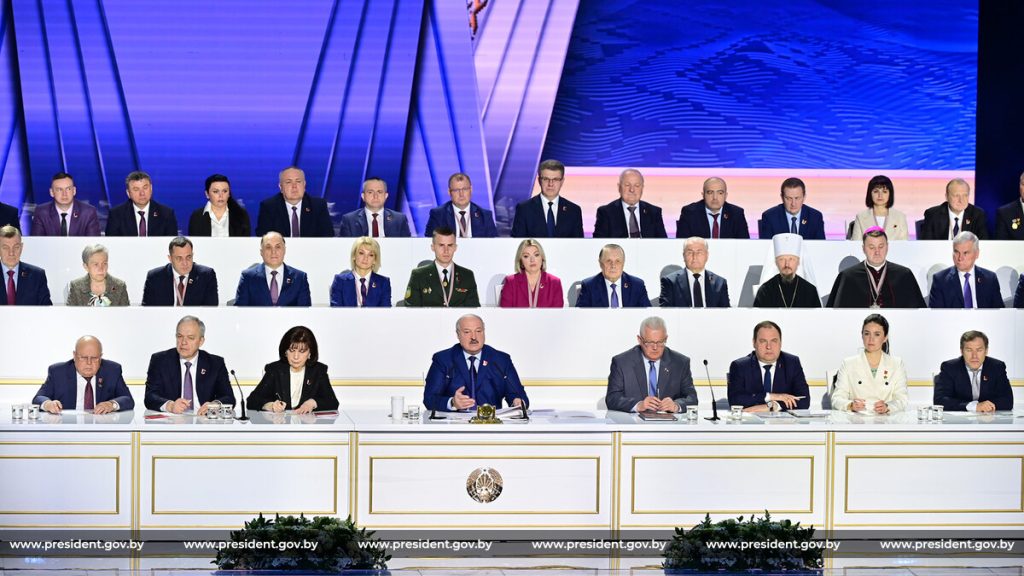
Lukashenko’s speech after his election to the new post was more substantive than the day before:
- “I take the support of the current president as a serious trust. Thank you very much.”
- “We have prepared materials that it is customary to discuss at the level of the Security Council, in silence.”
- “Without unnecessary lyrics and emotions, the facts are on the table! Listen, draw conclusions, think, make a decision”.
- Lukashenka began his speech by describing the military and political situation in the Eastern European region.
- “The military and political situation in the region, and in the world as a whole, is assessed by politicians and experts as a crisis situation with prerequisites for transition to the phase of global conflict, you have heard many times. Today we will talk about the forces and means by which threats to our national security are being fomented.
- “The US allocation of 60 billion for the war is the most important factor in the escalation of the conflict in Ukraine.”
- On the settlement of the situation in Ukraine: “to start with the Istanbul agreements, which Putin often talks about. Normal agreements. This does not mean that the negotiations will result in the adoption of these agreements initialled by the parties. But it is possible to start with them.”
- “I know the mood of the Ukrainian military. They are already fed up with this war. If we do not negotiate now, Ukraine may lose its statehood and cease to exist”.
- “Nobody wants to go to war today. That’s why we have to go to peace.”
- “The image of the enemy in the face of Moscow and Minsk the Americans have managed to form”.
- “Washington is progressively pushing aggressive narratives against the Belarusian and Russian states, raising the degree of hostility of the NATO bloc in our direction.”
- “By expanding the North Atlantic Alliance, which has admitted Finland and Sweden, Washington and Brussels continue to form a belt of unfriendly states around the Russian Federation. Other European countries are next in line to join the alliance. The goal is known. By design, everything should go up in flames on this line.
- “For Americans, China and Russia are not all adversaries and enemies. Europe itself, the European Union, is a serious rival for America. Americans do not need any opponents and competitors.
- Lukashenko offered the West to play a draw with Russia or Ukraine would cease to exist.
- On NATO’s nuclear capabilities: “Washington has stepped up, and significantly so, measures to verify the readiness for use of the components of the United States nuclear triad. The tactical nuclear weapons deployed on the territory of NATO member States, which I mentioned yesterday, are being modernized at an accelerated pace.
- Lukashenka on the operational and combat training of NATO countries on the territory of Poland and the Baltic States: “The series of exercises of NATO and US Armed Forces “Defender-2024″ currently being held in the European region has become unprecedented in its geographical scope and the number of forces and means involved. 90,000 people, up to 15,000 pieces of equipment, about 300 airplanes and more than 70 ships”.
- Lukashenka said that the West considers the Eastern European region as a potential theater of military operations. The adversary is defined: Russia and Belarus.
- “We see airfields, naval bases, training ranges being improved at a striking pace on the other side of our western border, and advanced bases are being created for the advance deployment and storage of equipment, weapons and materiel.”
- “Based on the level of military danger in the region, the armed conflict on the territory of Ukraine deserves special attention. The coalition of Western states is purposefully dragging it out. They have turned Ukraine itself into a drug addict who is being kept on a short leash with promises of a new dose of additional weapons, including long-range weapons and financial injections.
- On the situation inside the opposition: “Gnawing and fighting. And they want to organize a national liberation movement here. From whom? For the sake of changing the power in Belarus, they are really ready to do anything”.
- “We don’t want to go to war with anyone. And I’m sure we won’t go to war. They realize that we can seriously respond. And this is the simultaneous death of millions of people. It’s a new war. If anything, we will become all ‘Brest Fortress’ and defend our land.”
Lukashenka also put the National Security Concept of the Republic of Belarus (discussed below) up for public discussion. When asked about the expediency of publicizing this important strategic document, Lukashenko replied: “Why should we be afraid? After all, the main task is to resist, if necessary, and how will the people resist if they do not know what to resist in advance?
On April 29, Lukashenka listened to the report of the deputy chairman of the All-Belarusian People’s Assembly Aliaksandr Kosinets and head of the secretariat Valiery Mitskevich via a conference call. Following the first session of the VII All-Belarusian People’s Assembly held on April 24-25, the Belarusian leader set a number of tasks, outlining the main issues to be worked on within the framework of the new constitutional body.
First, Alexander Lukashenko instructed to build a system of work with the delegates of the All-Union National Self-Defense Council along the vertical line “Chairman – Deputy Chairman – Secretariat – delegates of the National Self-Defense Council.
“The Assembly consists of about 1,165 delegates. These are people from various social groups, including deputies of local councils, representatives of civil society. The system of work with them must be built,” the President outlined one of the main tasks. – Not from meeting to meeting, but on a permanent basis, including informing the delegates, feedback, schedule of meetings and so on,” said Lukashenko.
Secondly, building a structure to organize the work of the APA. It should be minimal, but certainly effective. Due to the fact that the main body dealing with the organizational work of the APA – its secretariat – will be small in number, the task is to organize a system of interaction with state bodies, governors, local authorities, and civil society actors.
In other words, Lukashenko is seriously building a parallel vertical of power in the country, which in both cases will be closed on him. But the fact that the key positions in these verticals will be occupied by representatives of the Vitebsk clan makes Lukashenko himself a hostage of the situation.
Last year the possibility of Natallia Kachanova coming to power, who is building her strategy of relations with Russia, was actively discussed. On April 7, Lukashenka had a long conversation with Kachanova. Apparently, at the current stage Lukashenka is sure that the Vitebsk people are his main allies and not a hidden threat.
International situation
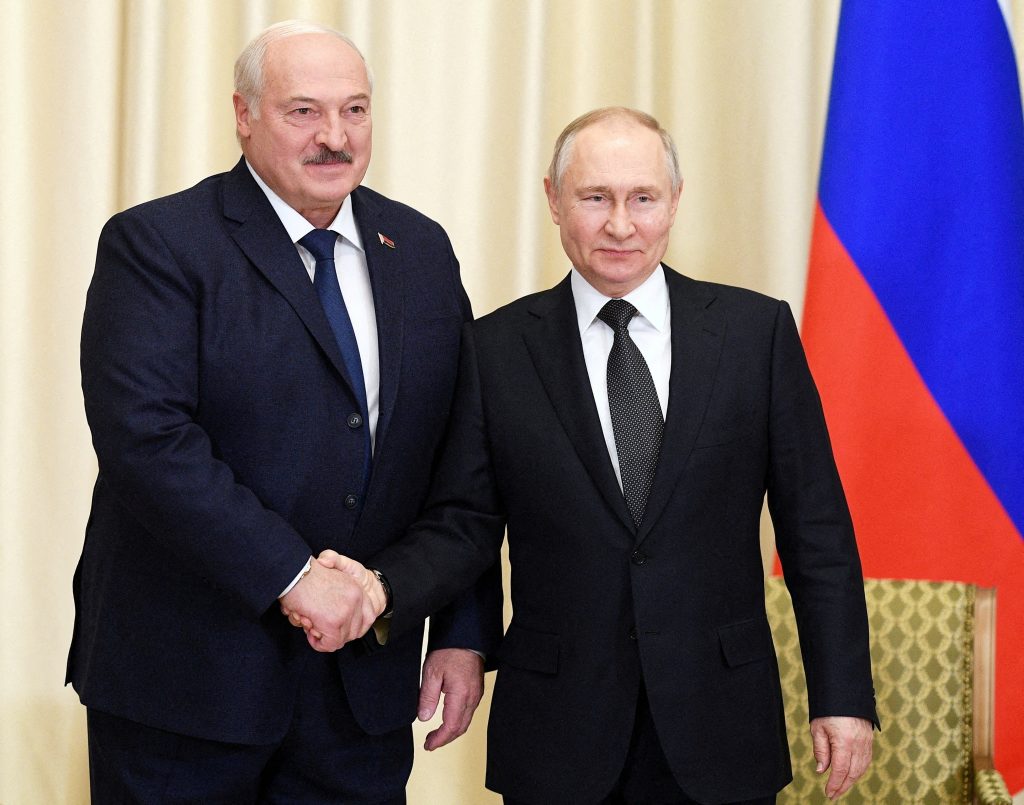
During this time (the second half of February – early May 2024) Lukashenko made three visits to Russia, spoke with Vladimir Putin three times by phone, received three delegations from the Russian Federation in Minsk, as well as received the head of Republika Srpska (an entity within Bosnia and Herzegovina) Milorad Dodik (February 19) and congratulated several African and Asian leaders on taking office.
On February 21, Lukashenka visited Kazan, where he participated in the opening of the “Games of the Future” (Russia’s sporting and political response to Russia’s ineligibility of Russian athletes for the Paris Olympics). He also spoke with Russian Defense Minister Sergei Shoigu, Rostec head Sergei Chemezov (who has great influence on the Belarusian government), Industry and Trade Minister Denis Manturov, and the presidents of Kazakhstan and Tajikistan, the foreign minister of Kyrgyzstan, and others.
Rais of Tatarstan Rustam Minnikhanov presents Alexander Lukashenko with the Order “Duslyk” (“Friendship”). The Order is awarded in Tatarstan “for special merits in strengthening the international prestige of the Republic of Tatarstan”.
On March 2, Putin and Lukashenka had a thorough telephone conversation, during which the leaders of Russia and Belarus discussed topical issues of the Belarusian-Russian relations, summarized the results of the previous events and high-level contacts (including the meeting in Kazan and the meeting of the Supreme State Council of the Union State), and outlined prospects for the near future in the development of bilateral relations. They also discussed the problems in the work of integration structures – the Eurasian Economic Union, the CSTO and other formats, the most pressing international issues and the situation in the region, as well as the prospects for its development.
On March 25, Governor of Omsk Region Vitaly Khotsenko visited Belarus, on April 1 – Governor of Orel Region Andrei Klychkov, and on April 22 – Governor of Arkhangelsk Region Alexander Tsybulski. The visits took place within the framework of the program of establishing horizontal contacts between Belarus and each constituent entity of the Russian Federation, which has been underway since 2021. The dialog with Tsybulski (who is a close friend and protégé of Russian Presidential Aide Maxim Oreshkin) was the most substantial. Lukashenka and Tsybulski discussed the possibility of Belarus’ participation in the development of the Northern Sea Route, as well as the logistical opportunities that cooperation with Arkhangelsk Oblast opens up for Belarus.
It is worth mentioning that Belarus has already built a logistics chain through a network of agreements: in July 2023 – with the Pskov and Novgorod regions, in September 2023 – with the Leningrad region, in October 2023 – with the Vologda region. The April agreements with the Arkhangelsk region finalize the process of creating a new logistics chain about 1,700 km long – to ports on the White Sea. There is also a 650 km long logistics chain to ports on the Baltic Sea (in the Leningrad Region), but the Baltic ports of the Russian Federation are heavily congested.
On April 2, the Presidents of Belarus and Russia exchanged congratulations on the Day of Unity of the Peoples of the Two Countries.
On April 11, Lukashenka visited Moscow for a one-on-one conversation with Vladimir Putin. Reportedly, Putin was interested in the issue of Belarus’s support amid the ongoing attacks on Russian oil refineries – he was also interested in the terms of reserve supplies of oil products from the Mozyr and Novopolotsk refineries for the needs of agriculture in case the condition of Russian refineries becomes critical.
They also discussed possible joint military exercises and joint defense projects. Putin again tried to actualize the topic of external threats to Belarus from Poland and Lithuania. He also handed over data on spying and sabotage activities of the intelligence services of Great Britain and Ukraine on the territory of Belarus.
April 12, Alexander Lukashenko and Vladimir Putin held a joint event on the occasion of Cosmonautics Day. The heads of state summarized the results of the mission to the ISS, where a joint Russian-Belarusian crew worked for the first time in history. The Presidents talked to the astronauts and discussed further prospects of cooperation in the space sector. Read about the flight of a Belarusian woman cosmonaut into space below.
On 8-9 May, Alexander Lukashenko paid his third visit to the Russian Federation during the period under review. In Moscow, he took part in the meeting of the tenth anniversary summit of the Supreme Eurasian Economic Council (dedicated to the 10th anniversary of the signing of the Treaty on the Establishment of the EAEU.
The event was narrowly and extensively attended.
Lukashenko, speaking at the summit, voiced the following theses:
- “Even by the strictest account we can state that the first 10 years have been passed quite successfully. We have practically reached the final stage of Strategy-2025 implementation”.
- “The measures we have taken have objectively contributed to an increase in mutual trade between EAEU member States. At the end of 2023, the growth rate amounted to almost 105 percent. In absolute figures, this is about 90 billion dollars. And this is despite the continuing difficult situation in the global markets”.
- “In what areas do we need to strengthen work in the EAEU?
1️. Financial support for industrial cooperation. “I ask the Commission to proactively engage in this work and organize interaction both in terms of industries and with the involvement of business associations and unions of the Union’s member states. Considerable funds have been allocated for subsidizing projects”
2️. Seamless access to public procurement. “The issue of expanding mutual participation in public procurement requires urgent resolution. Because it is closely related to import substitution and technological sovereignty”
3️. Digitalization. “We need to focus on the early recognition of electronic digital signatures. We have been talking about this for years. All agreements in principle have been reached long ago, but the wreck is still there”
4️. Technical regulation. “I am sure no one in this room needs to be convinced that the digitalization of technical regulation will provide our industry with additional opportunities for development”
5️. Transportation services. “The Commission needs already today to establish a permanent channel of information exchange with the SCO countries, first of all with China”
6️. Food security. “I consider it necessary to improve the work on unification of requirements related to the circulation of agricultural products, more actively introduce innovative approaches in the agro-industrial complex”
7️. The EAEU’s international positioning. “The parallel participation of the EAEU countries, as well as our partners in the Commonwealth of Independent States, in the SCO and BRICS opens up huge advantages for all of us.
After the summit, Vladimir Putin and Alexander Lukashenko had a long conversation that lasted until 3 am. According to the presidents, they discussed security issues and the war in Ukraine. Lukashenko looked upset. According to closed sources, Putin persuaded Lukashenko to bring his troops into Ukraine. Lukashenko refused, but suggested that Putin consider establishing a Russian military base in the south of the country, not far from Ukraine’s borders. After that, Lukashenka twice publicly stated that Belarus did not intend to go to war, but would not let itself be insulted.

On May 9, Putin and Lukashenko announced that the defense ministries and general staffs of Russia and Belarus had begun joint preparations for exercises using non-strategic nuclear weapons. “Since non-strategic nuclear weapons are deployed on the territory of Belarus, this time we offered our friends, allies, and the president of Belarus asked for it, to take part in one of the stages of this exercise. Relevant instructions have been given to the defense ministries and general staffs of our armies. They have started joint training,” Putin said.
Interestingly, it was after Putin’s statement that Lukashenko fired General Gulevich, Chief of the General Staff of the Armed Forces of Belarus – an opponent of Belarus’ participation in the war against Ukraine.
In the morning of May 9, Alexander Lukashenko attended the military parade to mark the 79th anniversary of the Victory in Red Square together with other invited leaders of the countries and took part in the ceremony of laying flowers at the Tomb of the Unknown Soldier.
Space
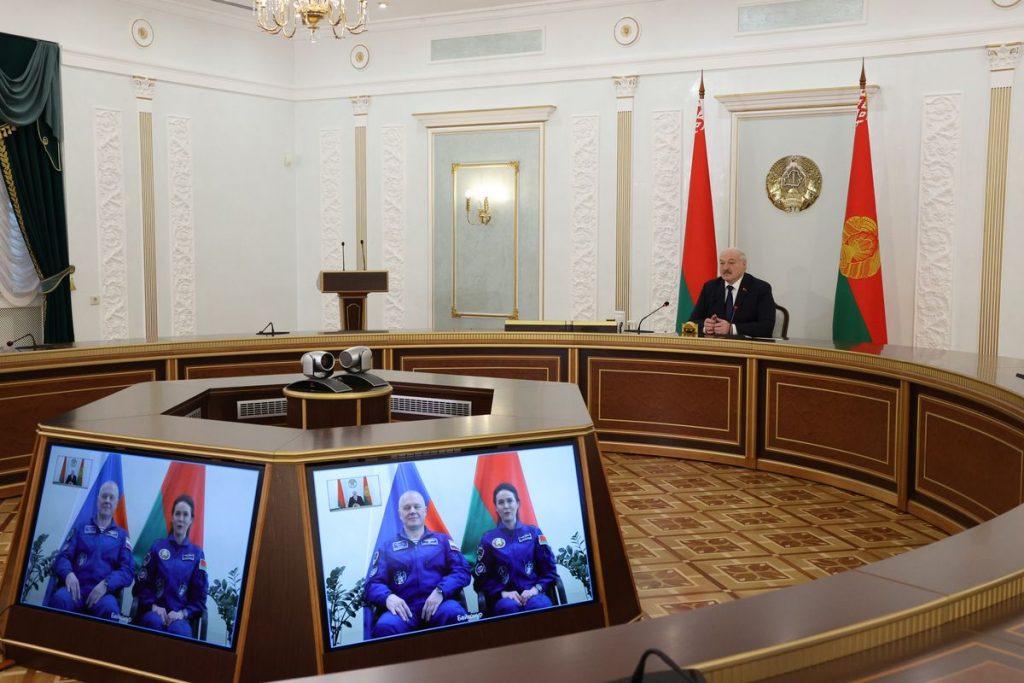
On March 23, 2024, a joint Russian-Belarusian crew flew into space. Belarus was represented by Marina Vasilevskaya, who had previously worked as a flight attendant for Belavia. A whole information campaign dedicated to the “first Belarusian woman in space” was conducted in Belarus (although in fact, back in Soviet times, Belarusians Piotr Klimuk and Uladzimir Kavalenok made three space flights each).
From the point of view of the state’s prestige and increased global attention to Belarus, Vasilevskaya’s flight is a significant success. In the West, however, this event will only strengthen the perception of Belarus as a satellite of Russia, moving in the policy of its powerful neighbor: both the deployment of Russian nuclear weapons, in connection with which official Minsk promotes the narrative of “the new nuclear power of Belarus” without much success, and space ambitions are perceived in the West as Russian projects.
By covering the flight of Marina Vasilevskaya, the state media tried to create an impression of euphoria that swept Belarus and contributed to further consolidation of Belarusian society around the authorities. It is impossible to assess the impact of the space epic on the Belarusian society, but it can be assumed that among Lukashenka’s supporters and the neutral audience it did cause a positive reaction and strengthened the sense of pride for their country.
Belarusian democratic forces, on the contrary, decided to ignore this event, and independent media published critical publications about Vasilevskaya’s flight and its significance. The emphasized proximity of Vasilevskaya to Lukashenka and the use of her image in propaganda influenced the position of some radical opponents of the regime (primarily outside Belarus) who hoped for the failure of the Belarusian-Russian space project. The postponement of the launch of the Soyuz MS-25 spacecraft due to technical reasons caused ridicule and gloating in social networks.
The contradictory reactions to Vasilevskaya’s flight became another confirmation of the deep split in the Belarusian society.
After 13 days of flight, on April 6, 2024, the spacecraft with Marina Vasilevskaya on board landed near the city of Zhezkazgan, Kazakhstan.
On April 12, Vladimir Putin and Alexander Lukashenka met with Marina Vasilevskaya and her space flight partner, Russian Oleg Novitsky, in Moscow. Three days earlier Lukashenka had awarded Vasilevskaya the title “Hero of Belarus.
On April 9, Alexander Lukashenko signed a decree “On the Belarusian Space System of Earth Remote Sensing. The document provides for the implementation of a joint Belarusian-Russian project on the development of the Belarusian space system of Earth remote sensing in 2024-2028.
The Decree defines the project participants from the Republic of Belarus and the terms of their activities. After the project is completed, it is envisaged to launch a Belarusian-Russian spacecraft of ultra-high resolution for remote sensing of the Earth with the period of active existence in orbit of at least 7 years.
Lukashenko is trying to show that under his leadership and thanks to his friendship with Russia, Belarus is turning into a nuclear and space state. At the same time, he shows the citizens of Belarus the decline of Ukraine, which had more preferable starting opportunities, but bet on the EU and the United States and failed.
National security

On February 20, Lukashenka held an enlarged meeting with the senior staff of the state bodies of the national security system, where he discussed the situation in and around Belarus. During the meeting he made a number of theses that form the basis of the current ideological scheme dominating in Belarus.
- There is no country or people on the planet that could have felt absolutely safe for the last decades. Military force has once again become the main argument of the world centers for solving issues. It is as if there were no millions of losses and horrors of the First and Second World Wars. And now we are literally covered with an information wave of the so-called premonition of the third world war, about which only a lazy person has not said. And there are grounds for apprehension.
- The forecasts are disappointing. The appetite and activity of the collective West will only increase. Washington and its allies will continue to expand NATO. The situation is more than favorable for them. Let me say it bluntly, without unnecessary diplomacy: almost all European leaders have become subjects of the United States. There is no doubt about whose policy, whose interests dominate the territory of the European Union.
- “Today our “fugitives” and their foreign handlers from special services are working out three main scenarios of their actions for the given period.” The first one is the most desirable for them. This is the organization of violent seizure of power right in the period of election campaigns. But at the same time they themselves assess it as unlikely. They do not see any real prerequisites for the situation to be rocked similar to 2020. The second, the main one. Using the current election campaign as a rehearsal and initial stage to prepare for a violent seizure of power during the upcoming presidential election in 2025. The third scenario is a “long game” with extensive use of soft power instruments in case the first two options fail. In fact, this game has not stopped for as long as sovereign Belarus has existed.
- The task of the Ministry of Defense for the coming year: qualitative transformation of the army and improvement of the country’s defense system. We must prioritize the combat training of military units and subunits. Especially since 2024 is the Year of Field Training in the Armed Forces.
- As President, I look at the work of the power bloc comprehensively and quite critically. I am even picky. These are the times. Every mistake can cost us dearly. The price is peace and people’s safety.
Lukashenko warned of a provocation in Poland, prepared by the Western intelligence services. “We know all the scenarios of various kinds of provocations, extremist actions with the involvement of militants located in Ukraine, Poland and Lithuania, extracted by intelligence, and we immediately publicize them as far as possible. We will now uphold this tradition. One more piece of operational information. I quote verbatim (this is already important for Poles): “Polish and American intelligence are preparing a large-scale provocation against the civilian population of Poland, which will be blamed on Russia and Belarus. At the same time, Warsaw is trying to recruit high-ranking Belarusian officials who will be able to replace our “tikhushki” and “lakhushki”. They will search for and create new figures loyal to the West and more effective here. All methods will be used – from banal bribery and blackmail to threats to life and health of you and your relatives and friends. Anyone can be the focus of attention.
On the same day Lukashenka signed a decree “On the transfer of state bodies and other organizations to work in wartime conditions. The document improves the procedure for transferring state bodies and other organizations from peacetime to wartime work, ensuring their coordinated and effective interaction in the event of threats to national security, taking into account changes in military and political conditions. The Decree defines the range of State bodies to which it applies, including the All-Belarusian People’s Assembly, the chambers of the National Assembly, the Constitutional Court and the Supreme Court. It also provides for the possibility of awarding military ranks to the heads of certain State bodies and a number of organizations when martial law is imposed.
On March 26, as part of a surprise check of combat readiness, Lukashenka inspected the area where a tank battalion was stationed at the Oshmian tactical direction (Hrodna Region, directly next to the Lithuanian border, 56 km from Vilnius). During the inspection trip Lukashenko said, “I will publicly say: any provocation must be stopped militarily. No one should be ceremonious with anyone. Any violation of the state border is to be shot to kill.” After the report on the situation in the northwestern direction, Lukashenka commented confusedly: “They shouldn’t behave this way.
While talking to journalists, Lukashenka spoke candidly: “It’s nothing for the madmen to bring a drone here, drop one mine and that’s it, we’re gone. And commenting on NATO actions near the borders of Belarus, he said: “They are provoking us so that we could respond to them in some way.
In Oshmiany, Lukashenka made a speech, which has already been dubbed the “Oshmiany Declaration” in Belarus. Its main points:
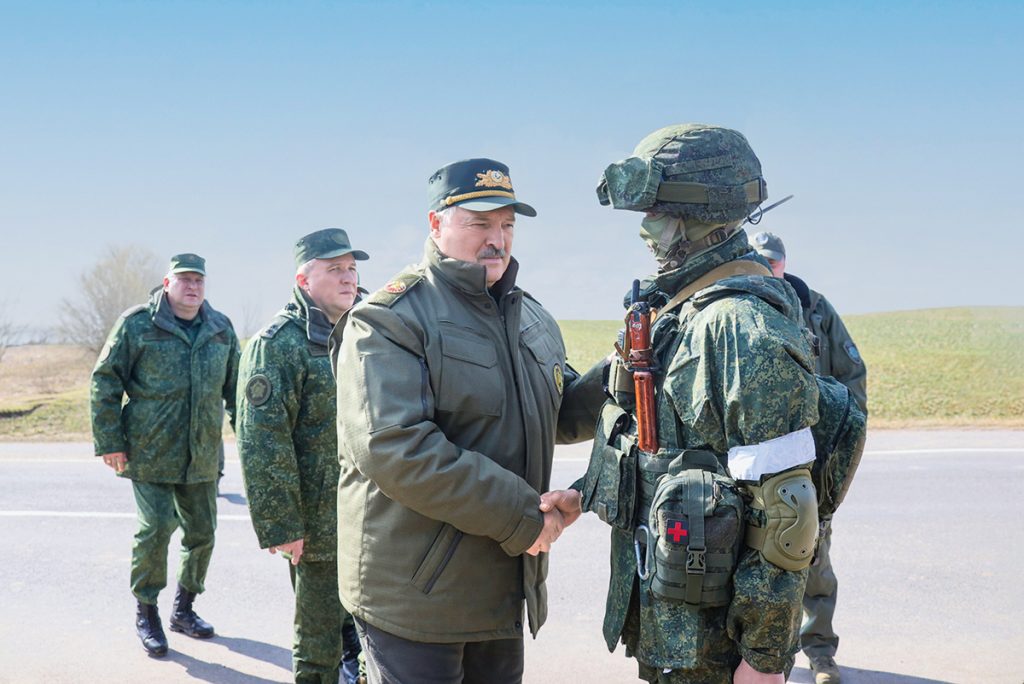
- “Neither Belarus nor, according to our information, Russia has any intention of attacking Poland or the Baltic states.”
- “At the same time, our Armed Forces and the entire national security system are ready to give a decisive response to any military invasion of our territory by NATO or structures under the control of this aggressive bloc”;
- “The Republic of Belarus has sufficient forces and means to respond to an armed provocation by neighboring NATO member states or the Kiev regime; participants in such provocations will be destroyed.”
- “Our military and political alliance with Russia is stronger than ever, with both countries rightly counting on each other’s support in the event of a military threat.”
- “The heinous terrorist attack in Krasnogorsk caused outrage in Belarus, we stand in solidarity with brotherly Russia, we also reaffirm the inviolability of allied obligations within the Union State, the Presidents of Russia and Belarus, law enforcement agencies acted in close cooperation, responding to this terrorist threat.”
- “The flight into space of Belarusian Marina Vasilevskaya testifies not only to the strength of the Russian-Belarusian alliance, but also to our commitment to peaceful and creative development”;
- “Strategic issues of national security and defense are referred to the competence of the All-Belarusian People’s Assembly, which is a manifestation of our determination to build our own model of people’s power, we demand that all states respect our choice, and this is an indispensable condition for peaceful coexistence in the future.”
On April 5, Aliaksandr Lukashenka agreed to introduce the draft law “On Suspension of the Treaty on Conventional Armed Forces in Europe” into the House of Representatives of the National Assembly. This treaty was ratified by Belarus and entered into force in 1992. It provides for the limitation of the total levels of conventional arms and equipment in five main categories (tanks, armored combat vehicles, artillery, attack helicopters and combat aircraft), as well as mechanisms to verify compliance with the obligations (information exchange and inspections). Belarus synchronized its actions with Russia, which also withdrew from the treaty on December 7, 2023. Lukashenka’s argument: in August 2022, the Czech Republic and in March 2023, Poland decided not to fulfill the treaty with regard to Belarus, and therefore it is null and void.
On May 3, Lukashenka made another surprise inspection – of the Central Point of the Air Force and Air Defense of Belarus. Measures were taken to assess the readiness for air defense. Lukashenko praised the performance of the military: “It is worthy. You have coped with all the objectives.”
On May 7, Lukashenka made a speech dedicated to the 79th anniversary of the Victory Day. During the speech, he repeatedly emphasized security issues:
- “No matter who in the “great democracies” opposes and obstructs, no matter what anyone says, regardless of personalities and statutes of limitations, we will identify and bring to justice those involved in Nazi atrocities. Even if posthumously or in absentia.
- “The expansion of military blocs and alliances to the detriment of the security of other countries, as well as the unprecedented build-up of NATO’s potential in our region, is heating up the situation. All this is already near the western and southern borders of our Belarus.
- “From certain figures we hear talk of war and nuclear strikes.”
- “It is high time for the peoples of Europe to realize that the Great Victory is our common heritage. Thanks to it, as well as to the political, economic and military power of the Soviet Union, peace has been ensured to the Eurasian continent for many decades”.
- “Today we are beginning to work out the second stage of response measures. For the first time it is planned to test the use of non-strategic nuclear weapons. The test is of an exclusively defensive nature!”.
- “We are not going to give in to provocations. We are not going to fight anyone. Throwing people into the crucible of war is not for me. Our task is that if the enemy’s boot steps on our land again, we must inflict unacceptable damage on the enemy.”
- “Nuclear weapons are weapons of deterrence. It is a weapon of defense. No one will go on the offensive with these weapons.”
- “I appeal to the peoples of near and far abroad: stop the maddened politicians, do not give them a chance to turn all life on the planet into ashes.”
- “Belarus responds to all attempts of intimidation with a consistent peacekeeping position, the policy of strategic deterrence.”
- “We have taken into account the mistakes of the beginning of the Great Patriotic War and will no longer fall for promises, provocations and silence of a direct military threat. Like Soviet soldiers in the distant ’45, we stand together with our ally to defend not only the territorial but also the borders of our common historical memory”.
- “Today, not only military force is important.No most advanced weaponry can break the people if there is unity.Our opponents understand this well and are doing everything to divide us.”
- “In saying all this, I think to avoid overreaching and straining our society. I don’t believe that in Western Europe, fattened up, someone will want to go into the trenches. They’re used to it, and our young people don’t want to. But we must be ready for anything. I don’t believe they’re mad. I don’t believe they’ll cross the line they drew themselves. But to prevent them from doing so, we must be strong, organized, monolithic”.
Schmidt’s escape
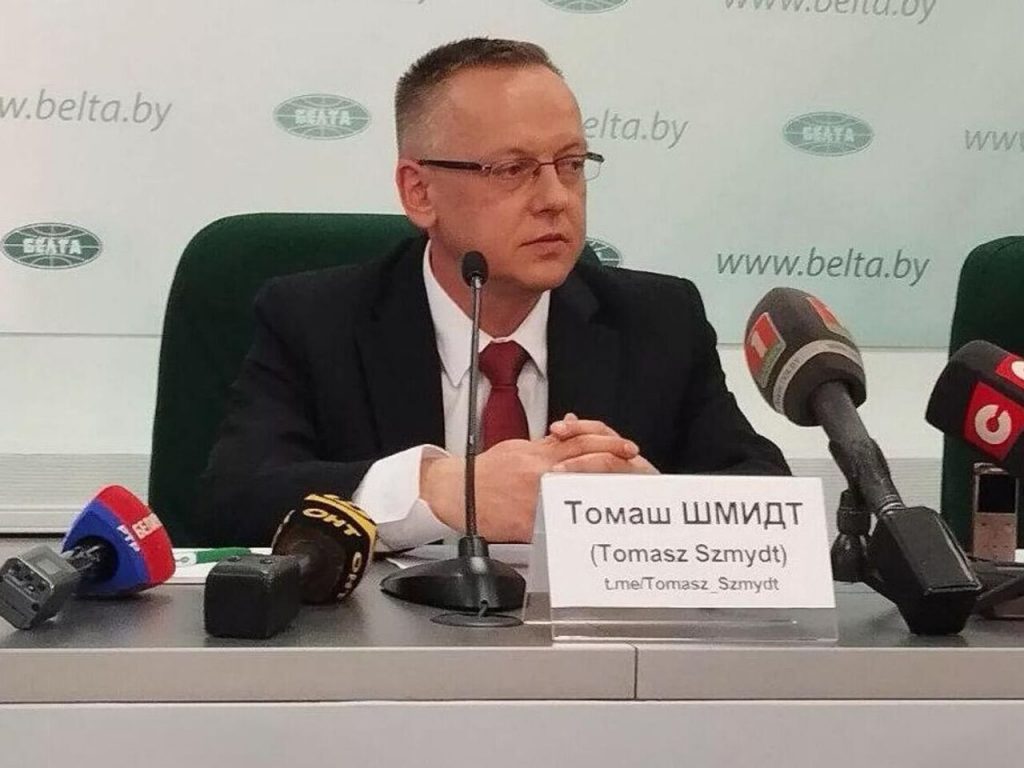
On May 10th , the well-known and influential Polish judge Tomasz Schmidt, previously admitted to state secrets, asked for asylum in Belarus. It is not clear what led to such a step of the influential judge. It turned out that Schmidt had previously been in Belarus (for example, in the summer of 2023), but it did not raise any questions from the Polish security services. The flight of the judge caused a real shock in Poland: at least twice the Cabinet of Ministers was convened, special meetings with law enforcement officials were held, a separate meeting was held in Brussels at NATO headquarters. For now, the situation is being studied. Tomasz Schmidt can give a lot of information to the Belarusian security services – in particular, about the activities of the Belarusian opposition in Poland, as well as about some military plans of Poland. But it’s too early to say how serious and evidentiary base Schmidt possesses. So far, the Belarusian propaganda machine is trying to present the escape itself as almost the greatest event capable of seriously affecting the balance of power in the region.
Economy
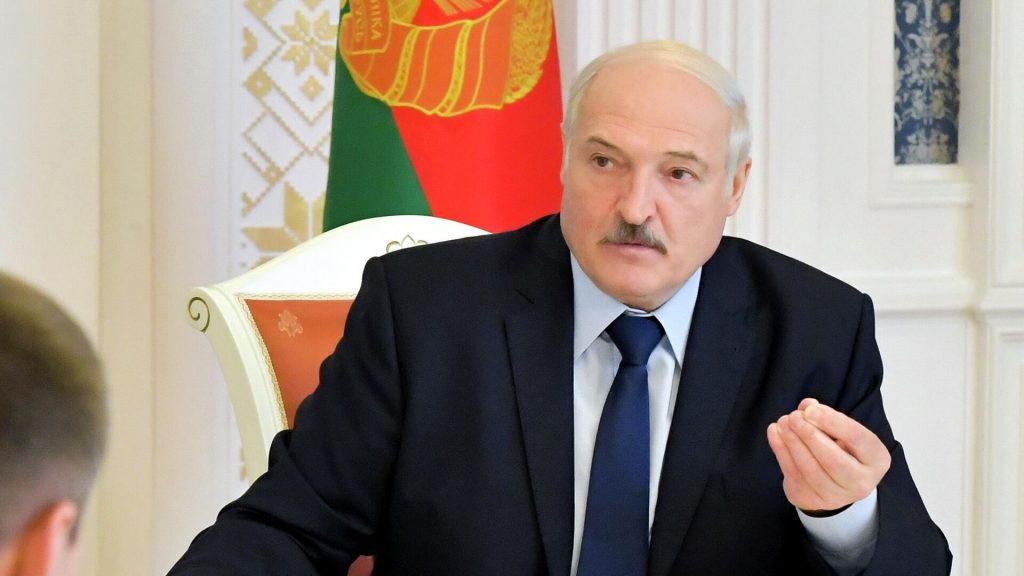
On March 12, Alexander Lukashenko held a meeting on the state and development of the mineral resource base in the country. The meeting was attended by the government, the National Academy of Sciences, all governors, heads of Belorusneft and Belaruskali.
Lukashenko’s main theses:
- “All minerals are our national treasure. A strategic reserve belonging to the people. And only to the people. This includes potash, oil, the largest resource – fresh water (an invaluable resource), and much more. But what we have, we need to dispose of competently and in an economic manner. And what we do not have, we need to look for. We are looking for it badly
- “In Belarus, the natural resources that are on the surface have been well studied. But we do not know everything about what is underground. That is why it is necessary to increase geological exploration. The country always needs its own mineral resources. They are the guarantee of sovereignty and stable economic development.
- “Mining of minerals is carried out all over Belarus. And the controlling bodies report that often the exploitation and reclamation of quarries are carried out with violations. I see it myself. It’s a terrible picture. They see the reasons in insufficient interaction between subsoil users and local authorities. They are mired in bureaucracy, endless approvals, expertise where necessary and where not necessary. And the business suffers.
- “I specifically directed that all the governors be invited here so that no one else would have any question on how to proceed.”
- On importing minerals: “Prices for minerals are rising year by year. And instead of moving and taking what is literally under our feet, we pay without complaint.
- On exports: “Last year, enterprises of the Ministry of Construction and Architecture reduced exports of crushed stone by a quarter. The Ministry of Energy supplied almost twice as little peat products abroad. Of course, they lost revenue. Everyone says “sanctions”. There are no sanctions for you. Look for other markets.
- “I remind you that our common goal is not only to produce products with maximum use of domestic raw materials. There are three pillars, three drivers of growth that will allow us to develop further. These are efficiency, import substitution and export. Let’s agree that in the Year of Quality all approaches to the quality of work should be reviewed”.
- “There are no and cannot be secondary topics in the economy today, because the sovereignty of Belarus and the well-being of our people depend on its sustainability. This is the most important thing. Go and look for what the country needs”.
March 13, Alexander Lukashenko signed a decree “On additional measures to ensure stable functioning of the economy. In particular, the adopted Decree defines the cases when authorization and payment of a contribution are not required when alienating the property of persons from unfriendly foreign states.
In early April, Lukashenka approved the State Investment Program for 2024. A total of 120 objects are included in the program this year, 41 of which are planned to be put into operation. It is also planned to start financing the construction (reconstruction) of 16 new facilities, including 4 road construction facilities, 2 family-type children’s homes, 2 hospitals, 4 infrastructure facilities. About 2.1 billion is envisaged to finance the objects included in the program, of which more than 80% – for the implementation of the state programs “Roads of Belarus”, “People’s Health and Demographic Security”, “Law Enforcement”, “Agrarian Business”, “Border Security”, “Education and Youth Policy”, “Housing Construction” and others.
On April 9, a meeting on industrial development, previously postponed twice for various reasons, was held. More than 250 participants took part – the Government, governors, heads of various enterprises.
Lukashenko’s main theses:
- “Industrial products have been produced for almost 30 billion rubles, the growth rate is almost 113 percent. There has been a significant increase in the output of electronics, cars, trucks and combines. “Planar, INTEGRAL and BelOMO have fully formed a portfolio of export orders for the current year and partially for the upcoming 2025”.
- “Why has the output of refrigerators, tractors, forklifts, engines decreased?”.
- “The industry was able to level out the negative trends of 2019 – 2020. Supplies are reoriented to the markets of friendly countries. First of all, to the traditional market of our Russia and other CIS countries”.
- “For the far abroad, the situation is much worse. The sales volume amounted to less than 20 percent in relation to the pre-sanction year 2021. Plans for exports to friendly countries of the far arc have not been fulfilled. There is a huge demand for industrial products in Africa, Latin America, Asia today. We need to work hard here and occupy our niches. And first of all – in the African continent”.
- “Food security is one of the most vital issues for Africa.”
- “Our strategic task is to set up joint assembly production facilities for Belarusian machinery in the supporting countries.”
- “The key objective today is to diversify exports. Everything that is required from me for this purpose is being taken immediately. The necessary conditions have been created, and you need to use the measures of financial support for Belarusian exports as actively as possible.”
- “Everyone has heard, in his annual Address the President of Russia announced that by 2030 the subjects of the Federation should receive about 40 thousand buses, trolleybuses, streetcars, electric buses. The money for this has been allocated. The task of the Belarusian industry is to get involved and provide at least 30 percent of the required volumes.
- “We can create competitive equipment using domestic materials and components. There is no need to prove anything.
- “However, in a number of areas the renewal of products and production facilities is very slow. Each critical position shows our weaknesses. It is precisely on these that competitors then hit us with sanctions.
- “It is necessary to take measures to ensure maximum technological independence and create conditions for sustainable operation of the economy, independent of any sanctions. And this is a strategic task for our industrial complex”.
- “The bulk of today’s projects is the modernization of industrial giants that we have preserved since the Soviet Union (MAZ, Tractor Plant, BELAZ). This is good, but we need to create absolutely new, advanced production facilities that produce innovative products. Therefore, another task for solving the existing problems is to strengthen the integration of industry with science”.
- “Already now we have to prepare the research base and engineering and technical personnel to develop promising technologies and form a scientific and technical backlog for the further development of the microelectronics industry.”
- “Our strategic task is to achieve technological sovereignty in cross-cutting areas that ensure the sustainability of the entire economy of the country. These are means of production, machine tools, robotics.Projects to achieve technological sovereignty should become the motor of renewal of our industry, help the entire economy to reach the advanced level of efficiency and competitiveness”.
- “Today it is very difficult to compete on price with Chinese manufacturers. But we have to, we can’t go anywhere. So, we must take exceptional product quality and provide the service necessary for the consumer”
- “We have to reach approximately the Japanese level of quality. The goal is to gain a foothold and increase market share, and if we mindlessly chase the minimum price, we will lose not only the quality of the final product, but also the production of our own component base.
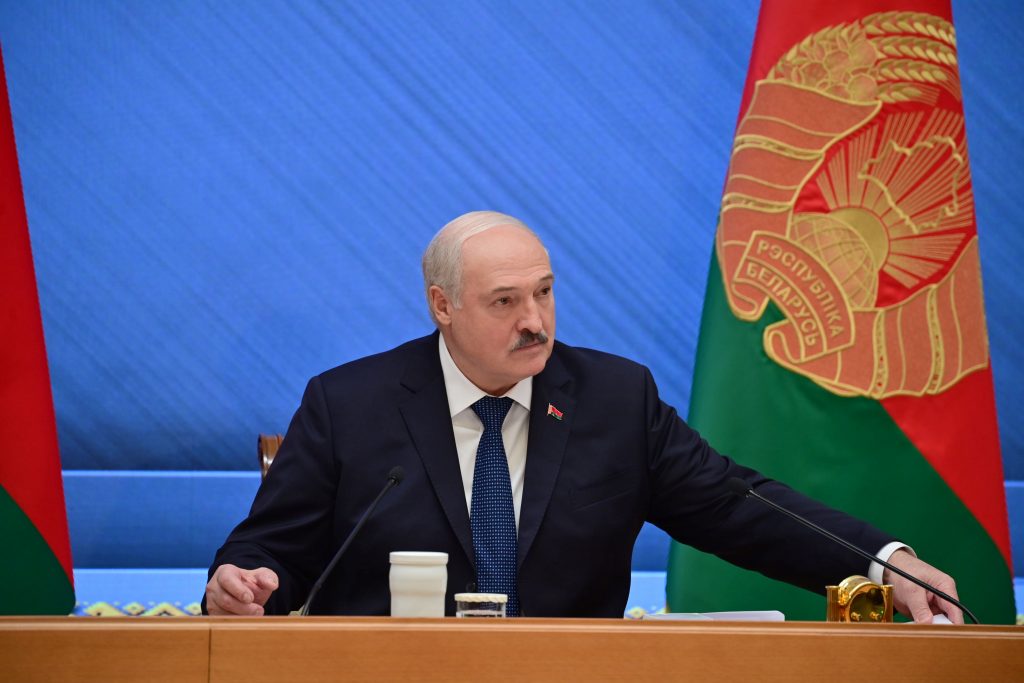
On April 16, Lukashenka held a meeting on rural development and improving the efficiency of the agricultural sector. The format was the same as when discussing the state of affairs in industry. The main theses:
- “The welfare of our people, foreign exchange earnings, level of food security and ultimately socio-political stability in the country largely depend on the state of affairs in the countryside.”
- “We need to forget about sanctions and other Western scaremongering.”
- “We need to expand production and export of high value-added products. Develop national brands ahead of competitors. Conquer new product and geographical segments”.
- On the reasons of “underperformance” in crop production: “the individual structure of sown areas, developed by science and practice, is not observed; the volume of mineral fertilizers is reduced, land reclamation is poorly conducted. It is high time to transfer the agricultural sector to a new technological level and introduce precision farming. It allows to create a favorable environment for any crop to grow, and thus reduce material costs, increase the volume and quality of production”.
- “If any of the governors expect to cover their needs with imported equipment, I recommend abandoning these fantasies. From the word “absolutely”. And don’t say that imports are better than ours. Especially today.”
- “Scientists, together with the Ministry of Agriculture and Food, annually speak about the existing development of feeding regulations for all types of animals. They express readiness to provide assistance in scientific support of technologies. Science has developed about 100 technological regulations and recommendations. Use them!”
- Lukashenko instructed to develop a 10-year strategy for the development of ultramodern pig breeding in Belarus. “It should include everything: progressive genetics, feed, environmental friendliness. The goals are superscale – maximum deepening of processing and our export expansion.”
- “This year we should produce 6-7 percent more and target a figure of 9 billion dollars in exports. Is it difficult? Yes, but we must solve these tasks. I appeal to managers at all levels. You should always be short of your success”.
- “Solving the personnel problem is impossible without creating proper conditions in the countryside – medical care, transportation, trade and consumer services.
- “And we have strong model farms that are role models, which are developing themselves and thanks to which small settlements – ‘villages of the future’ – are thriving. People should strive to work there!”
- “Our strategic goal is to create a high-tech, profitable agricultural sector. It is vital for us to maximize the existing potential of our agro-industrial complex, to deal with current problems, to think about tomorrow and even the day after tomorrow. I have told you what to do. Get involved and work”
On April 22, Lukashenka signed the Law on Entrepreneurial Activity. The law establishes an updated architecture of entrepreneurship and provides for two categories engaged in entrepreneurial activity – legal entities and individuals. The legal entities include small organizations with up to 100 employees, medium-sized organizations with up to 250 employees, and large organizations with over 250 employees. The category of physical persons includes artisans, owners of agro-eco-houses, self-employed, and individual entrepreneurs.
The types of activities which individual entrepreneurs will be able to carry out will be determined by the Government by July 1. For types of activities that will not be included in the planned list, registration of new individual entrepreneurs will cease as of October 1.
It also establishes the obligation for existing individual entrepreneurs to transfer to legal entities before January 1, 2026. At the same time, a simplified procedure is introduced for such entrepreneurs to transfer to commercial organizations with continuity of all rights and obligations to the budget and counterparties.
The law provides for new types of financial support, including reimbursement from the budget of a part of capital costs when implementing investment projects with loans from the Development Bank of Belarus. In addition, the right to receive state financial support for medium-sized businesses is expanded. Previously, this instrument was available only for small businesses.

